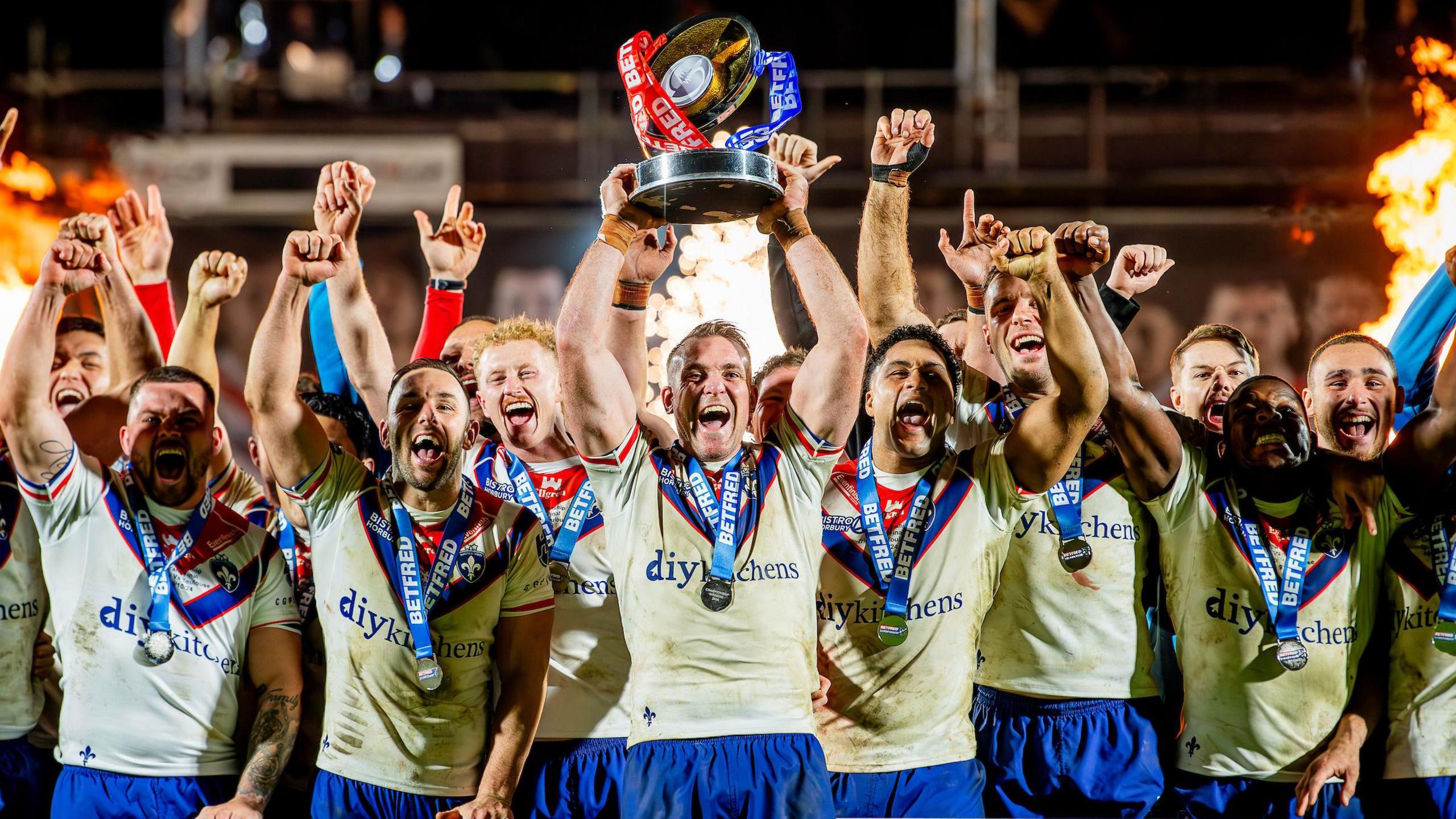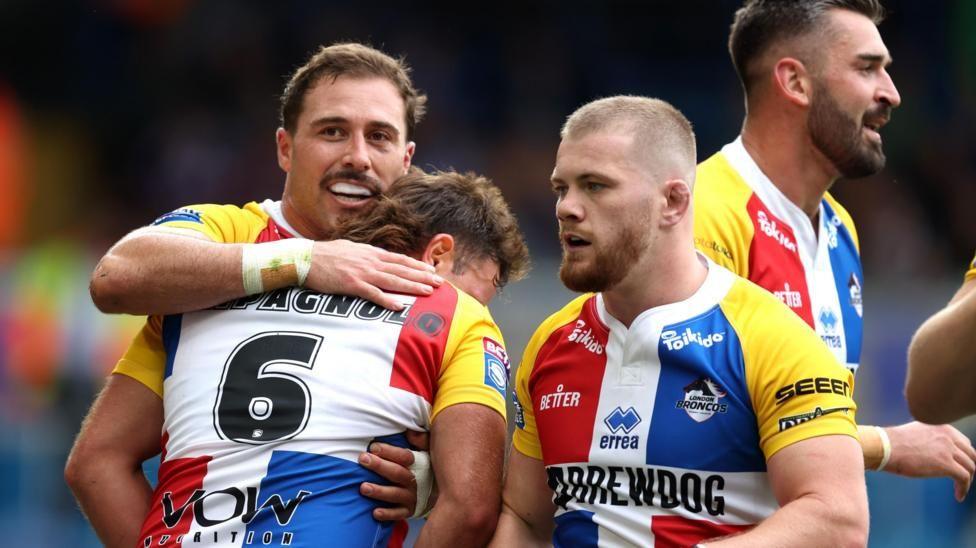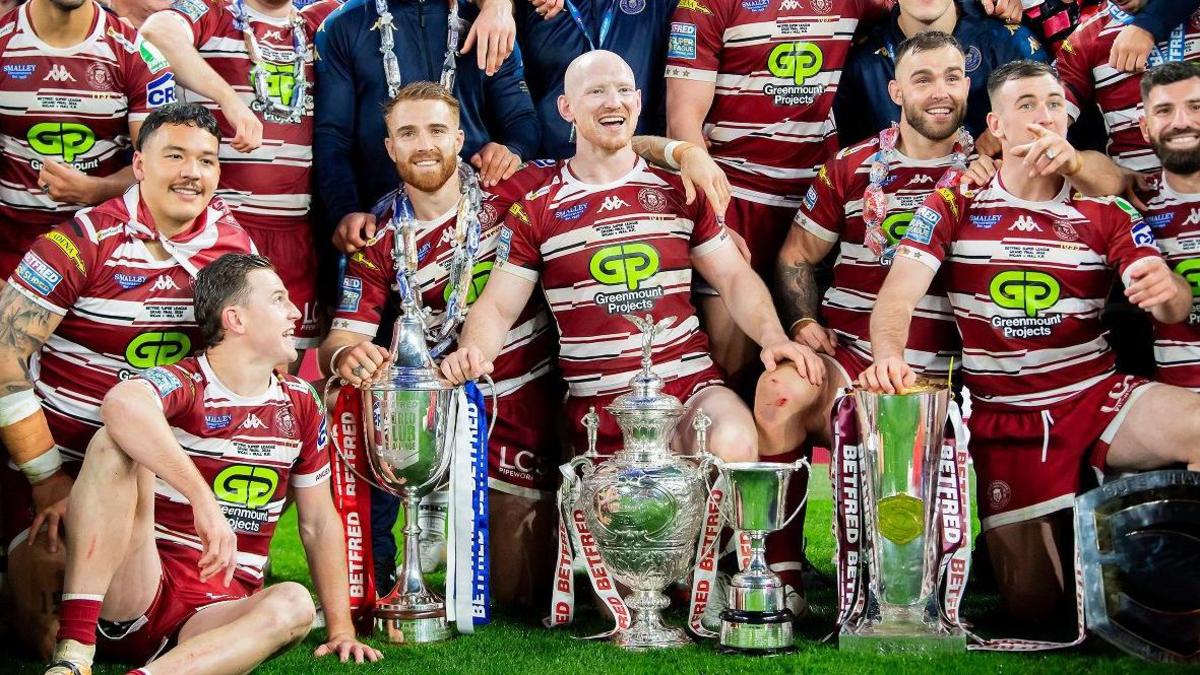Wakefield replace London in Super League for 2025

Wakefield Trinity beat Toulouse Olympique in Saturday's Championship Grand Final
- Published
Wakefield Trinity will replace London Broncos in Super League for 2025 having been awarded Grade A status as part of a restructure of the sport that will take effect next season.
The 2024 Championship Grand Final winners are among nine clubs along with St Helens, Wigan, Leeds, Warrington, Hull KR, Catalans, Leigh and Castleford to receive Grade A status.
Hull FC, Huddersfield and Salford received the highest B gradings and will complete the 12-team Super League next season, with Toulouse and London narrowly missing out.
Clubs have been graded under media giant IMG and Rugby League Commercial's 'Reimagining Rugby League' initiative.
Clubs in Super League, the Championship and League One have been assessed based on points calculated for on and off-field performance in order to decide who will make up the top flight in 2025, rather than promotion and relegation between the divisions.
They will be regraded again next season, giving clubs a chance to improve their ranking to earn a spot in a higher division.
London, promoted to the top flight for 2024 after beating Toulouse in the 2023 Championship Grand Final, were ranked 24th in 2023's initial IMG gradings, meaning they were likely to only spend one season in Super League.
But they moved up 10 places to 14th and missed out on retaining their place by just over a point.
They will now play in a 13-team Championship next season with Toulouse, Bradford, York, Widnes, Featherstone, Sheffield, Doncaster, Halifax, Batley and Barrow alongside Hunslet and Oldham who were promoted from League One last term.
League One will consist of Swinton, Whitehaven and Dewsbury all of which were relegated from the Championship, with Keighley, Rochdale, Midlands Hurricanes, Workington, North Wales Crusaders, Cornwall, Newcastle and Goole.
Financially challenged Broncos narrowly miss out

London Broncos finished bottom of Super League this season but level on points with 11th-placed Hull FC
Clubs in the top three tiers of British rugby league voted in favour of IMG's proposed club grading in April 2023.
The Rugby Football League (RFL) said the change aimed to "incentivise clubs to grow their fanbase and top-line non-centralised revenue, to better engage with fans, to be run in a best-in-class way, to invest in their club and the sport in a sustainable way, and to ensure strong governance".
The change, which is the biggest transformation of rugby league for a generation, generated criticism, however.
London Broncos owner David Hughes expressed his concerns before the start of the 2024 season as the then newly-promoted Super League club began the campaign seemingly certain to be relegated back to the Championship for 2025.
Broncos were ranked 24th in 2023's illustrative gradings - 4.38 points short of the top 12 - meaning that an extraordinary finish would have been necessary to even come close to retaining their top-flight place.
In the end, despite outperforming expectations and coming close to finishing above Hull FC on points difference, the Broncos finished bottom of Super League and Hughes put the club up for sale.
With no parachute payment for being relegated, the Broncos said last week that they need to raise £350,000 in the next month to ensure their survival next term.
How were clubs awarded points?
Clubs were awarded points - and a grade - based on five categories: Fandom, performance, finances, stadium and community, with a maximum of 20 points on offer.
Fandom [5 points]: Taking in attendances, memberships and digital engagement with fans.
Performance [5 pts]: Teams rated 1-36 in terms of league position over three seasons, with bonuses for league/cup wins.
Finances [4.5 pts]: Income, financial stability, diversity of revenue streams and business performance.
Stadium [3 pts]: Quality of facility, match-day experience, capacity, utilisation.
Community [1 pt for foundation, 1.5pts for catchment area]: Success of foundations as charitable arms, and how much competition for supporters in local area.
To reach Grade A status, clubs had to score at least 15 points, with 7.5 points receiving a B grading.
How did each club score in IMG's gradings?

Wigan Warriors won a historic quadruple in 2024 but finish second in IMG's gradings
St Helens topped the gradings having received the highest score of 17.02 points out of the maximum of 20 available, while quadruple winners Wigan were second on 16.91.
Last year's grade leaders Leeds (16.84) slipped to third place after a disappointing 2024 campaign on the field, with Sam Burgess' Warrington fourth on 16.27.
Hull KR (15.97) and Catalans Dragons (15.52) also retained their A grading and were joined by Leigh (15.13), Super League's recent success story.
Wakefield surged into the top eight with 15.09 and Castleford completed the grade A teams on 15.02 points.
The 2025 Super League cohort is completed with three B-grade teams - Hull FC (14.51), Huddersfield Giants (14.48) and Salford Red Devils (13.97), with the latter only narrowly retaining their top-flight status despite finishing fourth under Paul Rowley this season.
Toulouse (13.58) and London (12.65) missed out on a Super League place but achieved grade B status along with York (12.42), Bradford (12.15), Barrow (11.22), Featherstone (10.75), Keighley (9.02), Halifax (8.79), Sheffield (8.77), Widnes (8.60) and Doncaster (7.52).
Workington (7.26), Swinton (7.15), Dewsbury (7.13), Oldham (7.00), Hunslet (6.98), Rochdale (6.47), Midlands Hurricanes (5.66), Cornwall (5.29), Newcastle (5.20) and North Wales Crusaders (4.72) all achieved Grade C status, with data unavailable to give Batley and Whitehaven a grading.
What has been said about the gradings?
In an interview with BBC Radio Manchester, RFL CEO Tony Sutton said that the gradings would provide the "blueprint" for teams to improve season on season.
He said that yearly gradings would force clubs to be competitive in all aspects rather than under previous structures such as the licensing system used briefly following the 2009 season.
"What I think this model drives is a blueprint for incoming positive investment and clarity for potential new owners to know what and where we would judge what would be sensible for them to invest in, but of course any investor makes their own choices," Sutton said.
"An internal incentive is that clubs are measured every year. This doesn't give you, as it did under the old licensing arrangement for example, three years' worth of security so there's always that driver of continually growing standards."
Hull FC were critical of their failure to achieve Grade A status, which they allege, external was partly down to their big screens at the KCOM Stadium not having the required 'pixel pitch' - something also criticised, external by Leigh owner Derek Beaumont.
Salford, who also missed out on Grade A status, partly put that down to the previous uncertainty, external around their Salford Community Stadium home and believe they will be in a better position to attain a higher grading in 2025.
Meanwhile, Huddersfield managing director Richard Thewlis said they would "drive towards an A rating" in future having missed out this season.
Analysis - Changes will force clubs to think sustainably
BBC Sport's rugby league reporter Matt Newsum
Wakefield Trinity are the obvious winners of the new grading system having matched their on-field performance in dominating the Championship this season with the right progress off the field to achieve grade A status and a Super League place.
Their investment from owner Matt Ellis, impressive revamping of their stadium and a glut of silverware having rebuilt in the second tier has helped to increase their score and in turn has caught the imagination of the fanbase.
London's improvement from 24th to 14th was not enough to salvage their top-flight presence in 2025 and their uncertainty given David Hughes' decision to step aside is an unfortunate by-product of this new licencing-style system.
Aside from the London anomaly, the overall purpose of IMG's strategy - raising standards and forcing clubs to think about the wider business - appears to have taken hold in tangible ways.
The decision to eradicate promotion and relegation in an organic way might be an anathema to British sports fans but this is one way of trying to improve standards and force clubs to think sustainably.
It means clubs can no longer just spend the full salary cap on players and max out on marquee gambles in a bid to gain success.
Ambition does not die in this system, as the likes of Hull KR, Salford and another A-grade club in Leigh all have shown in recent season.
But there is now a requirement for clubs to think about all aspects of the business in a sustainable way.